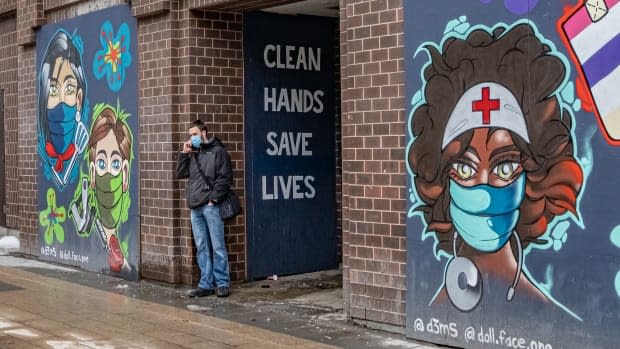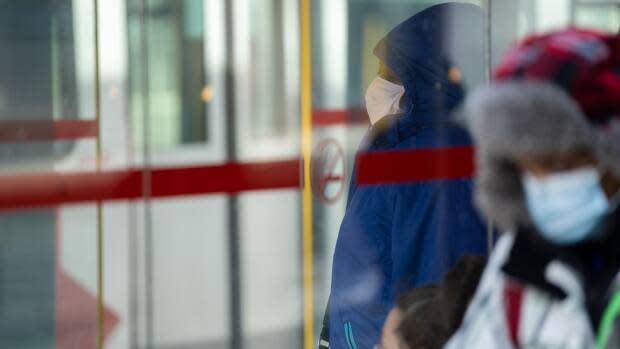What you need to know about COVID-19 in Ottawa on Saturday, March 6

Recent developments
Health officials in Ottawa reported 55 new cases of the virus on Saturday, but no new deaths.
Renfrew County's top doctor says the region's upcoming move to yellow should "send a message."
What's the latest?
Ottawa Public Health reported 55 new cases of COVID-19 on Saturday, but no deaths.
The top doctor for Leeds, Grenville & Lanark District Health Unit has tightened restrictions for some municipalities in eastern Lanark County after a rise in cases. The restrictions include limiting people in bars and restaurants to the same household and requiring staff to use extra PPE.
There were 20 new cases of the illness recorded in western Quebec Saturday.
Renfrew County's top doctor hopes the region's impending move to yellow on the province's pandemic scale "sends a message" to local residents.
The region, which has seen COVID-19 cases rise in recent days, will switch zones at 12:01 a.m. on March 8.
In the past months, the worry over the COVID-19 variants arriving in Ottawa was a question of when, rather than if. This week, we have our answer: it's now. Here's what you need to know about the city's race between vaccines and variants.
Ontario expects to give people 60 and older a first dose of COVID-19 vaccine by early June, officials said Friday, at least a month sooner than originally planned.
How many cases are there?
As of Saturday, 15,054 Ottawa residents have tested positive for COVID-19. There are currently 487 known active cases, 14,125 resolved cases, and 442 deaths.
Public health officials have reported more than 26,800 COVID-19 cases across eastern Ontario and western Quebec, including more than 25,000 resolved cases.
Elsewhere in eastern Ontario, 131 people have died of COVID-19, and 163 people have died in western Quebec.
Akwesasne has had more than 240 residents test positive on the Canadian side of the border and seven deaths. It's had more than 500 cases combined with its southern section.
Kitigan Zibi has had 21 confirmed cases and Tyendinaga Mohawk Territory has had six, with one death.
CBC Ottawa is profiling those who've died of COVID-19. If you'd like to share your loved one's story, please get in touch.
What can I do?
Restaurants, gyms, personal care services, theatres and non-essential businesses are open across eastern Ontario. Most sports can also resume.
Social gatherings can have up to 10 people indoors or 25 people outdoors. Organized events can be larger.
People are asked to only have close contact with people they live with, be masked and distanced for all other in-person contact and only travel for essential reasons, especially between differently coloured zones.
WATCH | Vaccine may protect against serious illness from virus variants, but you might still get sick
Both Ottawa Public Health and the EOHU are orange under the province's colour-coded pandemic scale.
They have more restrictions than the rest of the region, which is in green, the lowest level. Local health units can also set their own rules, like Kingston's is doing around St. Patrick's Day.
Health units in Renfrew and Lanark counties have warned private gatherings are a problem and could cause stricter rules. Ottawa's health unit is again saying it's close to a move to red.
Western Quebec's gyms and restaurants can open under its orange zone rules, joining non-essential businesses. Outdoor gatherings of up to eight people are now are now allowed.
That area's new curfew hours are 9:30 p.m. until 5 a.m.
The exception is Grenville-sur-la-Rouge and some of the surrounding area, which remains in red.
Quebec will allow extra-curricular activities and sports in schools across the province starting March 15
Like in Ontario, people are asked not to have close contact with anyone they don't live with and travel from one region of Quebec to another is discouraged.
Distancing and isolating
The novel coronavirus primarily spreads through droplets when an infected person speaks, coughs, sneezes, or breathes onto someone or something. These droplets can hang in the air.
People can be contagious without symptoms, even after getting a vaccine. New coronavirus variants can be more contagious.
This means it is important to take precautions now and in the months to come like staying home while symptomatic — and getting help with costs if needed — keeping hands and frequently touched surfaces clean and maintaining distance from anyone you don't live with, even with a mask on.
WATCH | Virus variants may cause half of confirmed COVID-19 cases by late March, professor says
Masks, preferably ones that fit snugly and have three layers, are mandatory in indoor public settings in Ontario and Quebec.
OPH says residents should also wear masks outside their homes whenever possible.

Anyone with COVID-19 symptoms should self-isolate, as should those who've been ordered to do so by their public health unit. The length varies in Quebec and Ontario; the latter recently updated its rules, including in schools.
People have to show proof of a recent negative COVID-19 test to enter Canada by land without a fine and have to pay for their stay in a quarantine hotel if entering by air.
Health Canada recommends older adults and people with underlying medical conditions and/or weakened immune systems stay home as much as possible and get help with errands.
Symptoms and vaccines
COVID-19 can range from a cold-like illness to a severe lung infection, with common symptoms including fever, a cough, vomiting and loss of taste or smell. Children can develop a rash.
If you have severe symptoms, call 911.
Mental health can also be affected by the pandemic, and resources are available to help.
Canada's COVID-19 vaccine supply has stabilized and four vaccines have now been approved.
In early March the national task force said evidence shows first doses have offered such strong protection that people can wait up to four months to get a second dose, opening the door for jurisdictions to spread first doses widely.
Ontario last updated its plan on March 5.
About 102,300 doses have been given out in the wider region since mid-December, including about 57,700 doses in Ottawa and 13,300 in western Quebec.
Ontario's first doses generally went to care home residents and health-care workers.
The province's campaign will include more priority groups such as people over age 80 starting in mid-March, moving to people as young as age 60 in June, and essential workers in May.
Ontarians who are eligible can book appointments online or over the phone starting March 15.
Local health units have some flexibility in the larger framework, so check with them for specifics.
For example, Ottawa has already begun offering shots to certain demographic groups in seven high-risk neighbourhoods. Appointments are now available over the phone.
Officials have also been vaccinating Indigenous people and has been offering shots to police officers and shelter clients this week.
WATCH | 'We don't have protection from the vaccine yet': OPH urges caution as COVID-19 cases rise
Many eastern Ontario vaccine clinic locations are in the same communities as test sites and none are open yet for the general public. Health units are asking people to keep their phone lines clear.
Quebec also started with people in care homes and health-care workers.
It moves to older adults outside care homes starting March 10 in western Quebec's six clinics, then essential workers and finally the general public.
People who qualify can make an appointment online or over the phone.
Pharmacists will also be giving shots in both Ontario and Quebec.
Where to get tested
In eastern Ontario:
Anyone seeking a test should book an appointment.
Ontario recommends only getting tested if you have symptoms, if you've been told to by your health unit or the province, or if you fit certain other criteria.
People without symptoms but who are part of the province's targeted testing strategy can make an appointment at select pharmacies. Travellers who need a test have very few local options to pay for one.
Ottawa has ten regular test sites, with mobile sites wherever demand is particularly high.
WATCH | Dr. Vera Etches on Ottawa Morning:
The Eastern Ontario Health Unit has sites in Alexandria, Casselman, Cornwall, Hawkesbury, Rockland and Winchester.
The Leeds, Grenville and Lanark health unit has permanent sites in Almonte, Brockville, Kemptville and Smiths Falls and a mobile clinic.
Kingston's main test site is at the Beechgrove Complex, another is in Napanee.
WATCH | A new daycare outbreak in Kingston:
People can arrange a test in Picton over the phone or in Bancroft, Belleville and Trenton, where online booking is preferred.
Renfrew County test clinic locations are posted weekly. Residents can also call their family doctor or 1-844-727-6404 with health questions.
In western Quebec:
Tests are strongly recommended for people with symptoms and their contacts.
Outaouais residents can make an appointment in Gatineau at 135 blvd. Saint-Raymond or 617 ave. Buckingham. They can check the wait time for the Saint-Raymond site.
There are recurring clinics by appointment in communities such as Maniwaki and Petite-Nation.
Call 1-877-644-4545 with questions, including if walk-in testing is available nearby.
First Nations, Inuit and Métis:
Akwesasne has a COVID-19 test site by appointment only and a curfew of 11 p.m. to 5 a.m.
Anyone returning to the community on the Canadian side of the international border who's been farther than 160 kilometres away — or visited Montreal — for non-essential reasons is asked to self-isolate for 14 days.
People in Pikwakanagan can book a COVID-19 test by calling 613-625-2259. Anyone in Tyendinaga who's interested in a test can call 613-967-3603.
Inuit in Ottawa can call the Akausivik Inuit Family Health Team at 613-740-0999 for service, including testing and now vaccines, in Inuktitut or English on weekdays.
For more information

